2025 – 2026
On behalf of the Mountainland Technical College faculty, staff, and Board of Trustees, I am honored to welcome you to an exciting school year.
As you begin your program here, you’re not just starting a class – you’re joining a college with over 50,000 alumni, hundreds of industry partnerships, and a proven track record of excellence. This is a place where careers take off – where hands-on training, expert faculty, and real-world connections come together to give you a true edge in today’s workforce.
Whether you’re working in one of our cutting-edge labs, meeting with career advisors, or gaining experience through an externship, everything we do is designed with your success in mind. At MTECH, we believe education should be purposeful, practical, and personal. Our mission is clear: to enhance the employability of every student through market-driven, career-focused education and training.
But more than that – we believe in you. We believe in your ability to rise, lead, and make a difference. You’ll be surrounded by award-winning faculty and staff who care deeply about your goals and will go the extra mile to help you achieve them.
You’re joining a community that will challenge you, support you, and celebrate you from your first day in the classroom to the day you graduate, career-ready and confident.
Welcome to Mountainland Technical College. We’re proud to have you with us.
Clay Christensen, President
Mountainland Technical College
At MTECH, you will join an exclusive group of graduates who are the beneficiaries of a commitment to excellence shared by everyone at the school. From instructors who deliver a relevant, high-impact curriculum to staff and administration focused on ensuring you have the tools you need to succeed, we all share the same goal: your success as a student.
To enhance the employability of individuals through market-driven career and technical education.
To prepare the workforce in the three county service region and implement the Mission Statement of the Mountainland Technical College through the five core areas of: Program Development; Student Achievement; Faculty and Staff Support; Physical Resources; and Community Outreach.
Mountainland Technical College’s Values Compact is our collective commitment to student success. By working together with a shared passion for our community, we support the student experience with the following:
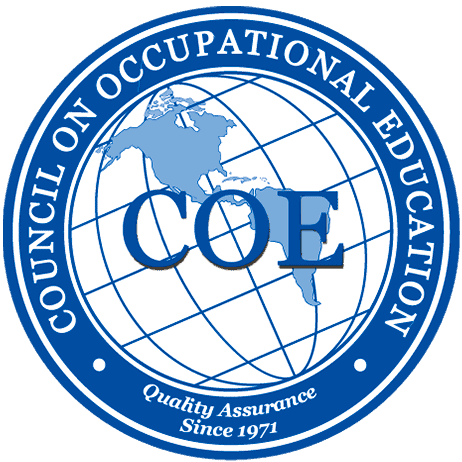
The Mountainland Technical College, or MTECH, is accredited by the Commission of the Council on Occupational Education. Information regarding accreditation may be obtained at:
Council on Occupational Education
7840 Roswell Road
Building 300, Suite 325
Atlanta, GA 30350
Telephone: 770-396-3898 / FAX: 777-3963790
www.council.org
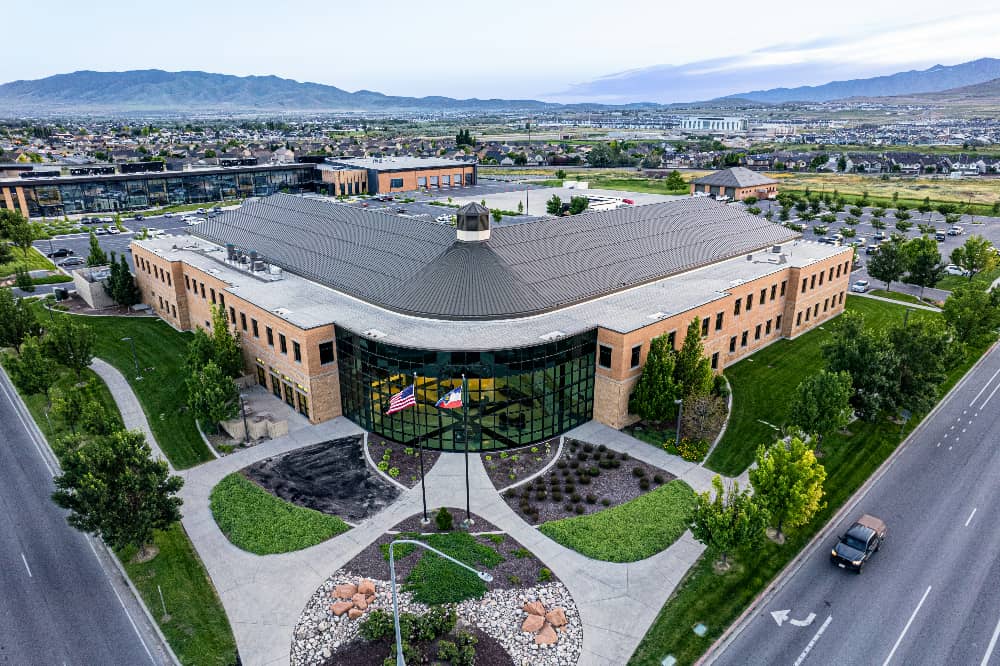
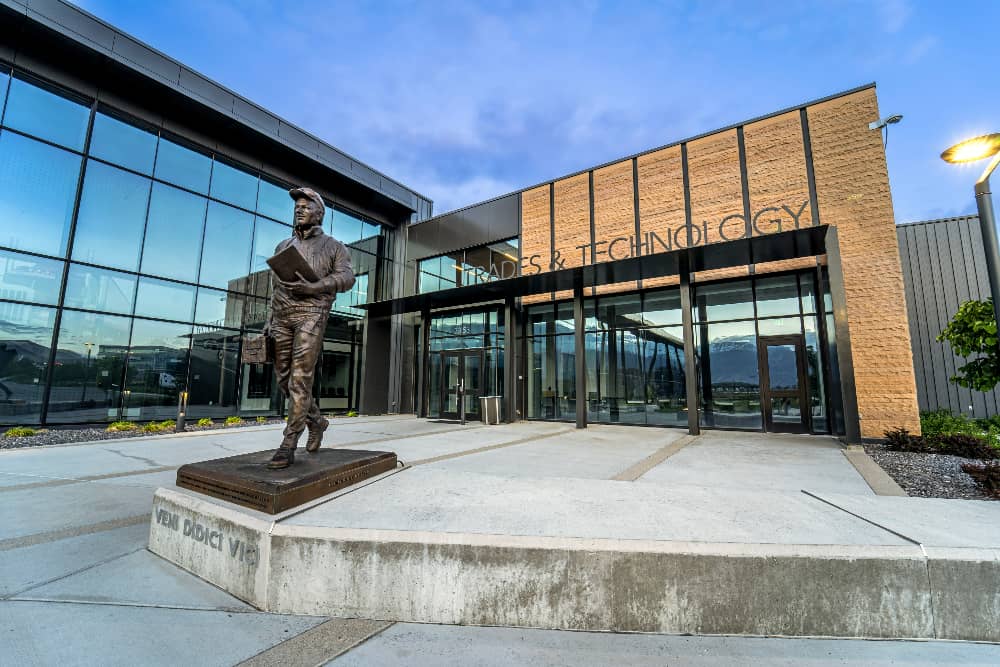
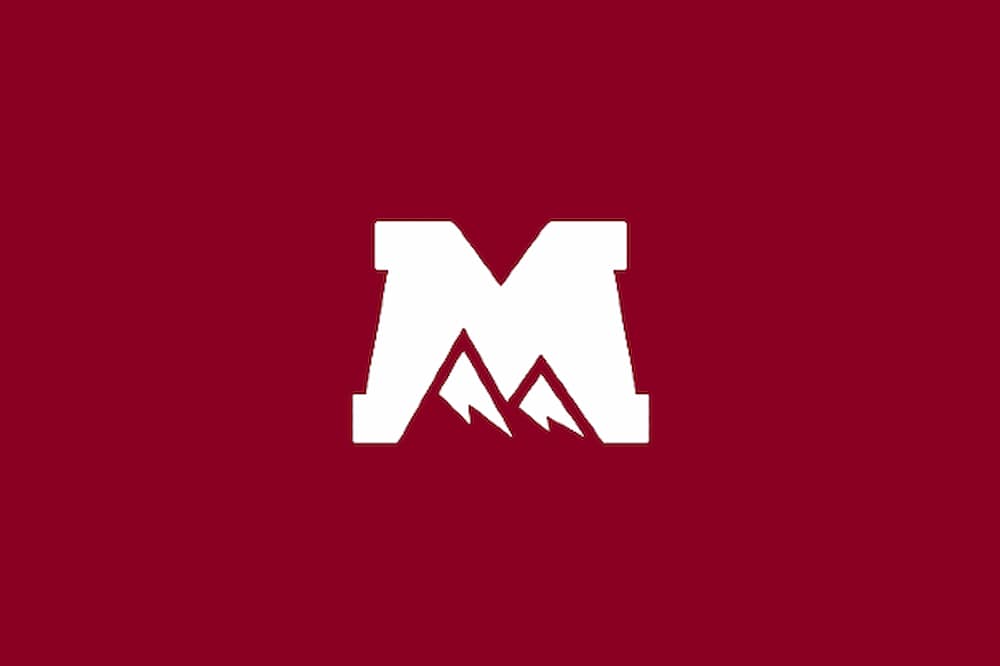
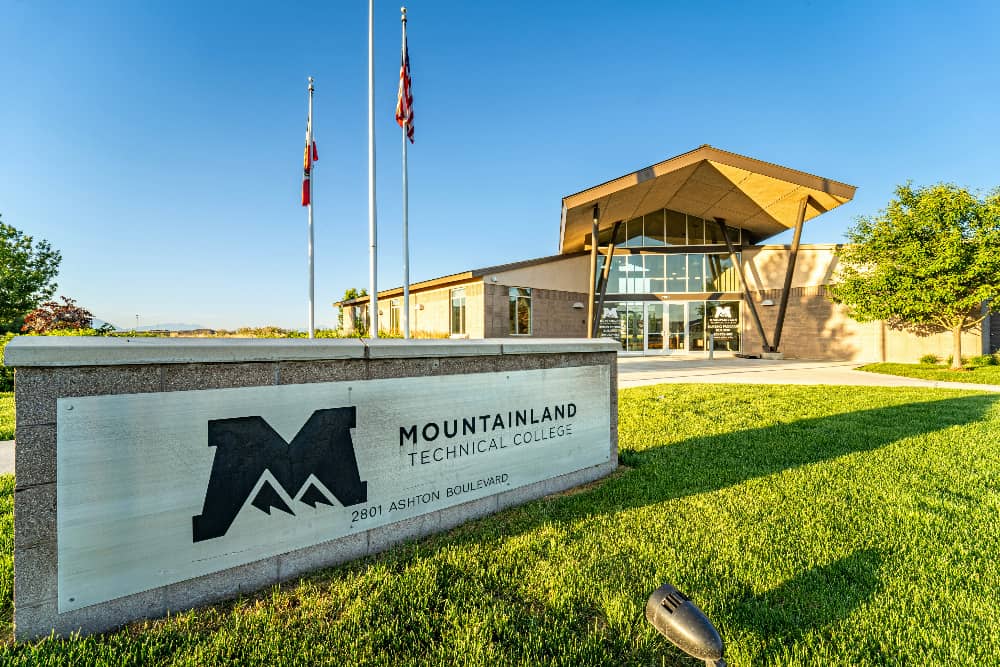
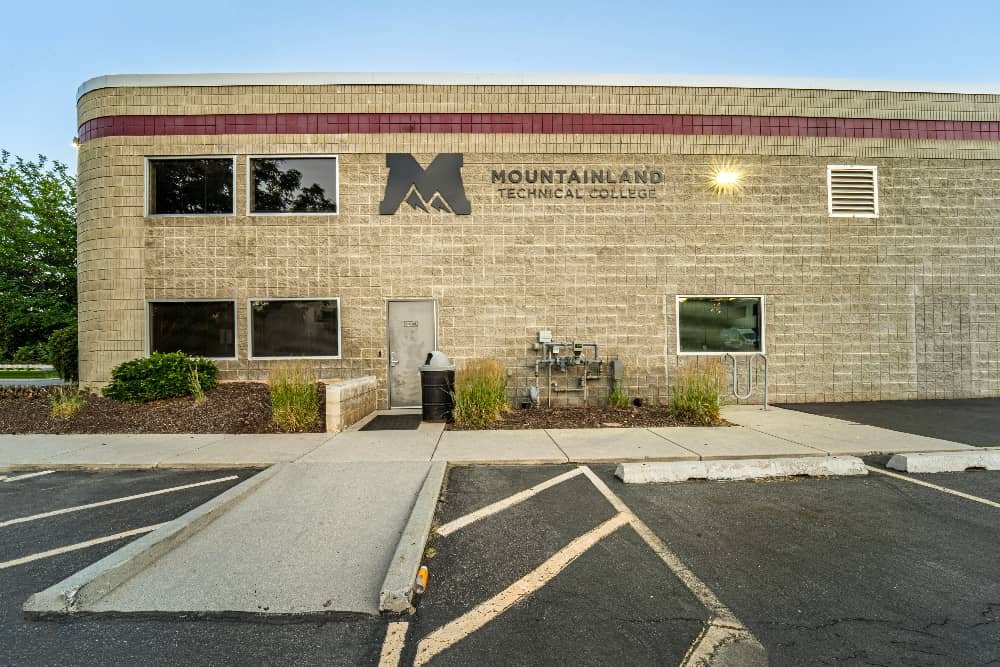
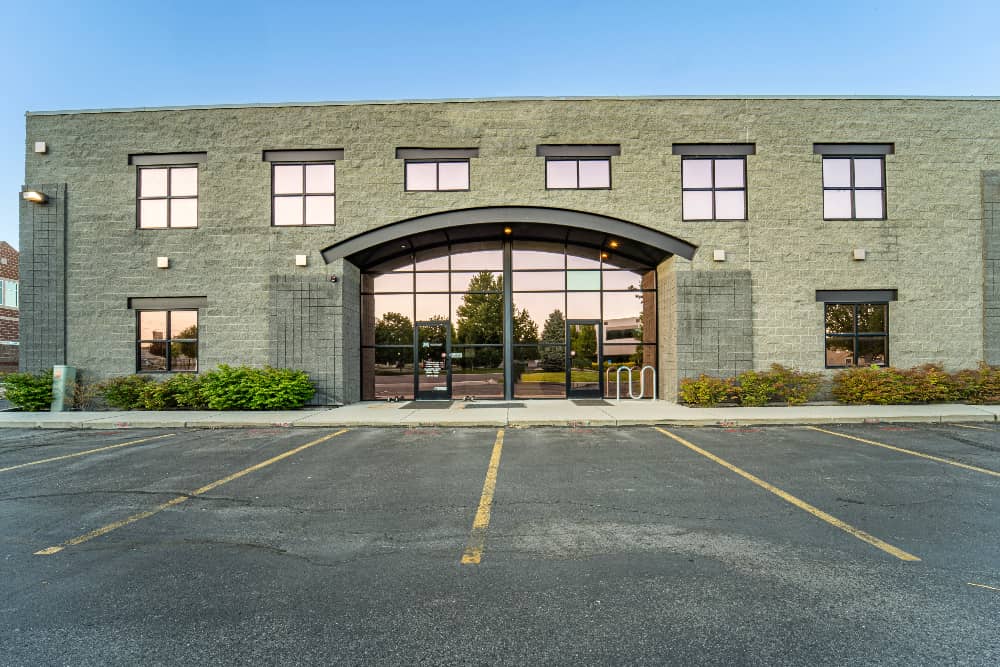
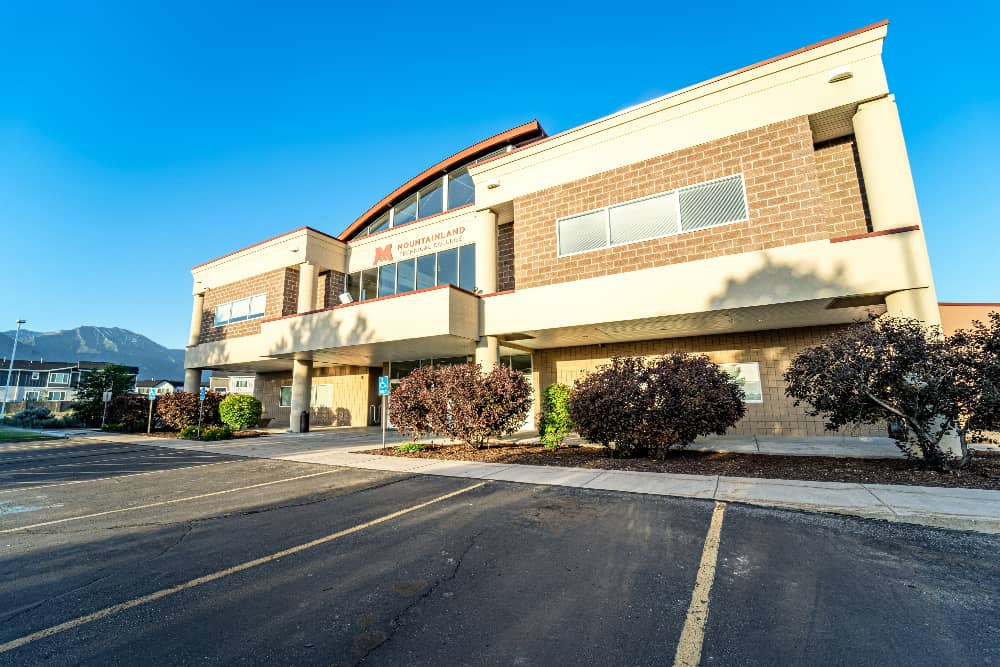
Building A
693 West 1210 South (Del Monte Road)
Spanish Fork, UT 84660
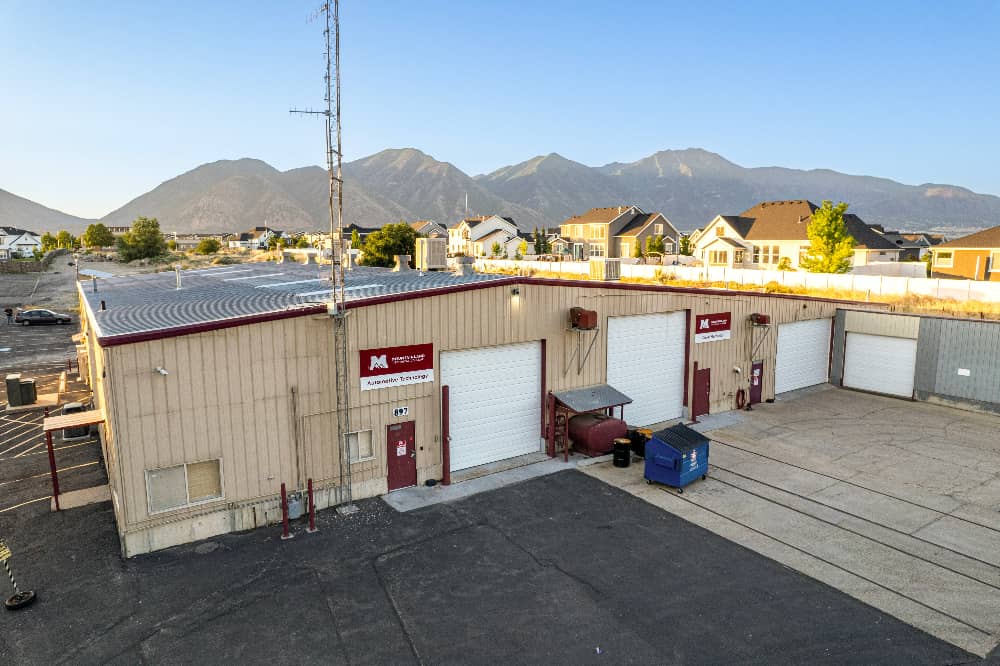
Building B
897 West 1100 South
Spanish Fork, UT 84660-5736
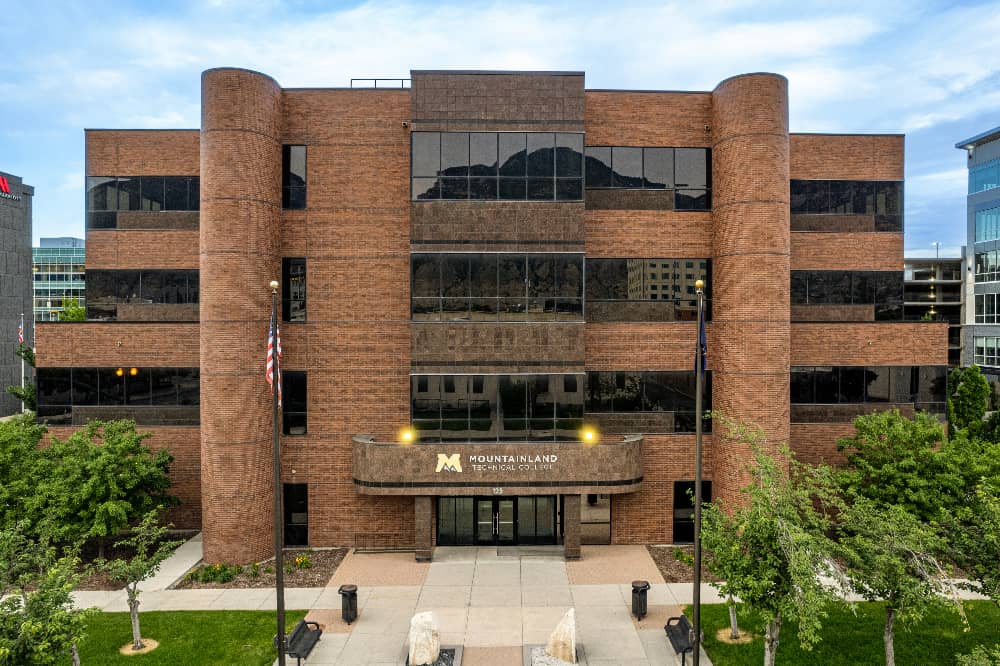
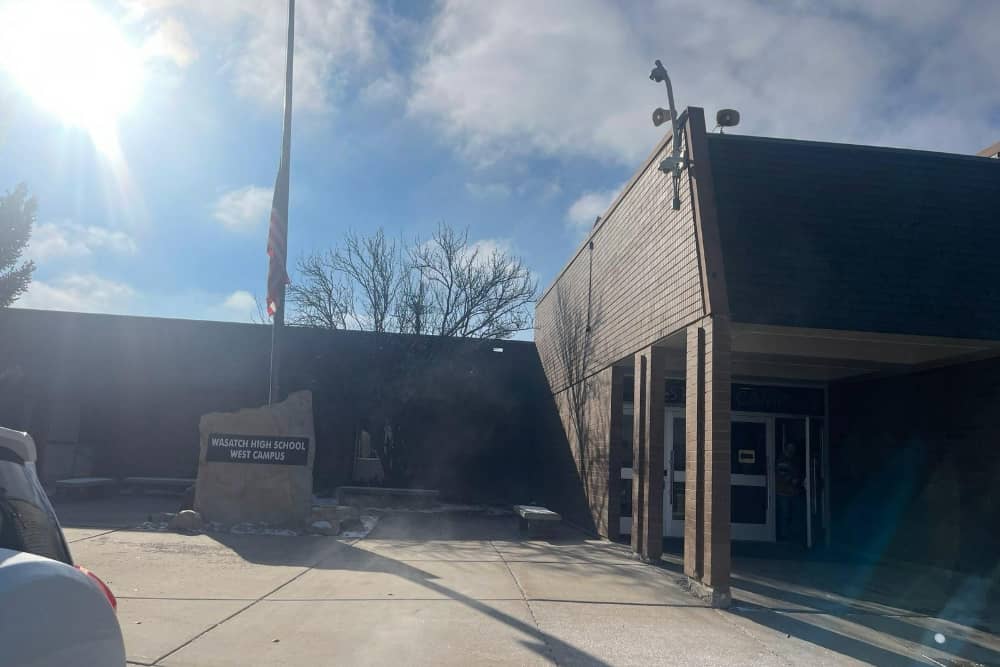
(Instructional Service Center)
200 East 800 South
Heber City, UT 84032
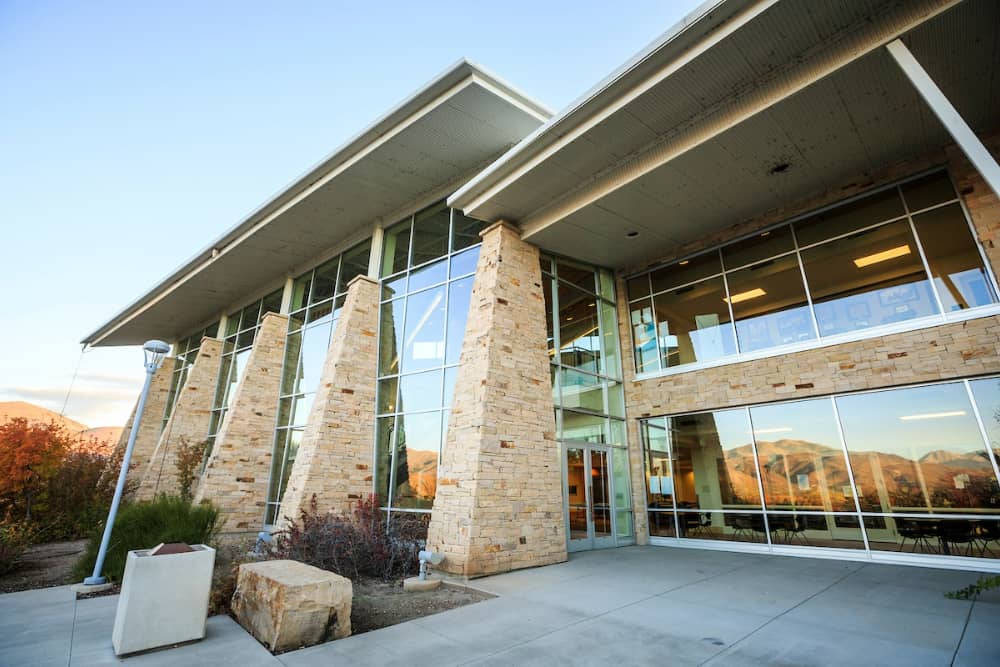
(Instructional Service Center)
3111 North College Way
Heber City, UT 84032
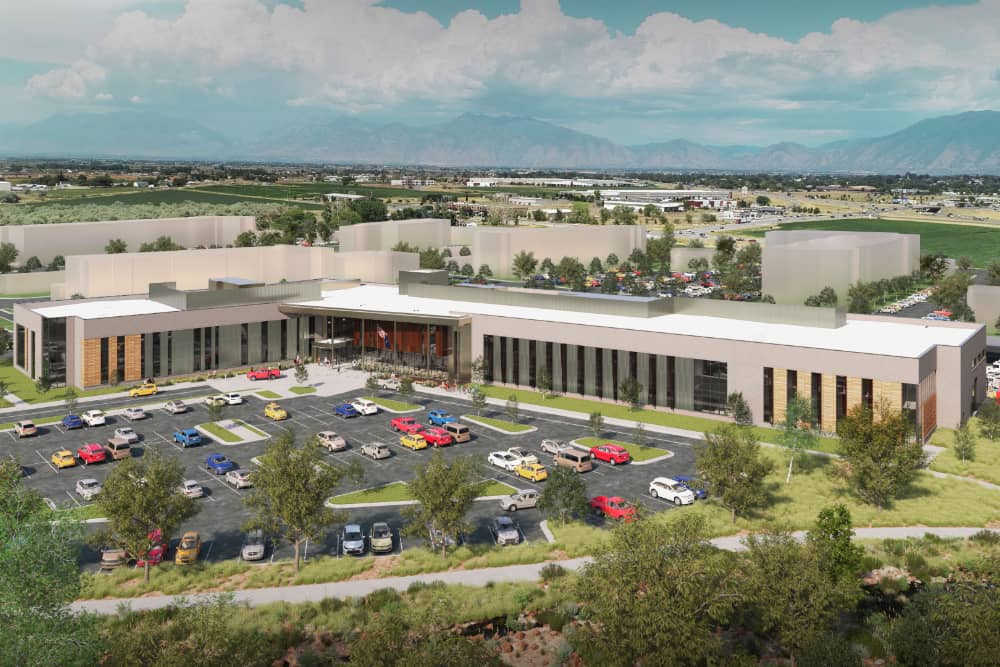
Our goal is to make the admissions process as smooth and accessible as possible. On our webpage, you will find details on admission steps, entrance assessment test requirements, application deadlines, program-specific criteria, pre-requisites, and more. Understanding this information is the first step toward beginning your journey at our college and preparing for a successful and rewarding career. Start here for help guiding you through each step of the admissions process and reach out to our admissions office if you need additional assistance.
After applying and completing any required prerequisites outlined on each individual program webpage, when registration is available, students will begin by enrolling in and paying for the first course of their selected program. Some programs will require more than one course to be paid for upon initial enrollment. Upon successful completion of the initial course/courses, students will continue to enroll in their next course/courses, paying for each course prior to the start of the course.
This model supports manageable scheduling and financial planning, while maintaining steady progress toward program completion. It is important to note that students must pay for each course by the start date to remain enrolled. Failure to do so may result in being dropped from the program.
Students are encouraged to stay informed of course start dates, deadlines, and payment requirements, to ensure continuous enrollment and avoid disruptions in their academic progress.
For specific enrollment schedules, payment deadlines, and course details, please refer to our program webpages or contact Student Services.
For more information please see 600.604 Admissions and Enrollment Policy and Procedure.
Admissions Advisors are available to students to get dedicated help with the admissions process. They can help with:
Email admissions@mtec.edu to contact an advisor, schedule an appointment, or request a personal or group campus tour.
Information sessions are available to prospective students in-person or virtually, providing an overview of programs, resources, and opportunities. By attending an information session, you can learn more about Mountainland Technical College and make an informed decision about your next steps. These sessions provide valuable insights into programs, admissions, and student resources to help you confidently move forward in your educational journey.
Information sessions cover:
See the Information Session webpage for the upcoming schedule.
Electrical Apprenticeship
The Electrical Apprenticeship program provides a solid understanding of the National Electrical Code (NEC), its layout, the requirements for different electrical systems, and the components of those systems. This program discusses the risks involved with electricity and electrical systems as well as the safety equipment and measures that are in place to protect electricians and the general public alike.
Objectives:
HVACR Technician
This program prepares students for an interesting and profitable career as an HVACR Technician. Technicians will install, service and repair equipment in a wide range of applications including residential, commercial, institutional, and industrial settings. This program provides participants with the opportunity to prepare for a successful career, anywhere in the world, and acquire the knowledge and skills that will qualify them for employment opportunities with incomes higher than the typical U.S. household. Additionally, this industry has proven to be resistant to economic downturns. With increasing energy costs and indoor air quality expectations, employment opportunities and earnings are on the rise.
Objectives:
Plumbing Apprenticeship
The Plumbing Apprenticeship program satisfies the educational requirements to take the State Journeyman Plumber Exam. To complete the entire Apprentice Plumbing Program, an individual must be licensed through the State and work under the supervision of a licensed Journeyman Plumber. A basic assessment is required prior to enrolling. This program provides a solid understanding of the International Plumbing Code (IPC), its layout, and the requirements for different plumbing systems and parts of those systems. This program discusses the processes, parts, and risks involved with the various plumbing systems as well as the safety equipment and measures that are in place to protect plumbers and the public alike.
Objectives:
Advanced Emergency Medical Technician
Advanced Emergency Medical Technicians provide basic and limited advanced emergency medical care and transportation of critical and emergent patients who access the emergency medical system (EMS). Advanced Emergency Medical Technicians (AEMTs) possess the fundamental knowledge and skills necessary to provide patient care and transportation. Advanced Emergency Medical Technicians function as part of a comprehensive EMS response, under medical oversight. Advanced Emergency Medical Technicians perform interventions with the basic and advanced equipment typically found on an ambulance. Advanced Emergency Medical Technicians function as a link between the scene and the emergency health care system.
Objectives:
Dental Assisting
The Dental Assisting Program is designed to prepare for employment of the professional Chairside Assistant. Students focus on the basics of dental assisting, nutrition, dental prevention, dental disease, infection control, instruments and tray setups for dental procedures, dental materials, anatomy, radiology, dental specialties, law and ethics, CPR, and clinical experience.
Emergency Medical Technician
The Emergency Medical Technician program provides training for out-of-hospital emergency medical care and transportation of critical and emergent patients who access the emergency medical services (EMS) system. Emergency Medical Technicians (EMTs) have basic knowledge and skills necessary to stabilize and safely transport patients ranging from non-emergency and routine medical transports to life threatening emergencies. EMTs function as part of a comprehensive EMS response system, under medical oversight. EMTs perform interventions with the basic equipment typically found on an ambulance. EMTs are a critical link between the scene of an emergency and the health care system.
Objectives:
Medical Assistant
Medical assistants are multi-skilled, allied health care professionals responsible for various clinical and/or administrative duties and are an essential part of a healthcare team. This program is designed to prepare students for entry-level positions that will allow them to learn and move into higher-level job opportunities by working with physicians and providers in office settings. Students in this program learn cognitive (knowledge), psychomotor (skills), and affective (behavior) learning domains by focusing on administrative and back office clinical skills. Upon successful completion of all required courses, students participate in an externship in a medical office. Graduates of the program are eligible to take a national certification exam.
Objectives:
Medical Coding and Billing
The Medical Coding and Billing program provides students with the technical skills and knowledge for an entry-level position in a health care setting through competency-based education.
All students in the Medical Coding and Billing program study medical terminology, anatomy, laws and ethics, standard medical billing and coding methods, medical coding software, and functions of the Electronic Health Record (EHR). Students develop administrative office skills, receive hands-on experience using a Medical EHR system to schedule, manage patient accounts, and enter patient documentation. The program prepares students to work as entry-level Medical Coder and/or Biller in a medical office, clinic, or hospital.
In addition, medical coding and billing specialists examine how to code diagnoses and procedures performed or identified by a physician. Students also explore how to process health insurance claims, examine coverage issues, and processes for billing and collections. Medical billing and coding specialists prepare to take the National Certified Professional Coding (CPC) examination through American Academy of Professional Coders (AAPC). There are other medical coding certification exams available including Certified Coding Specialist (CCS) offered by the American Health Information Management Association (AHIMA) and the Certified Medical Coder (CMC) offered by the Practice Management Institute (PMI).
Objectives:
Nursing Assistant
The Nursing Assistant program is designed for students to receive their certification by completing coursework in classroom and clinical settings.
Objectives:
Pharmacy Technician
The Pharmacy Technician program prepares students to support pharmacists by performing a wide range of practice-related duties for community, institutional, compounding, long-term care, mail-order, and other pharmaceutical settings. Students learn the most common medications, calculate dosages, process prescriptions, bill third-party insurance, learn aseptic techniques, and prepare sterile and non-sterile compounded medications. Students receive extensive hands-on training in the lab area using advanced pharmacy technology.
Objectives:
Phlebotomy
This program will provide students with the skills and knowledge needed to become competent phlebotomists. The program provides hands-on, competency-based technical education through classroom and laboratory instruction as well as hands-on practice. Lectures are given on basic and advanced phlebotomy, including the healthcare setting, overview of the human body, blood collection procedures, and special collection procedures. Laboratory skills being taught include:
Students have the opportunity to draw blood from classmates and volunteers. Upon completion students are eligible to take the National Certified Phlebotomy Technician (CPT) exam. Graduates are able to work as a phlebotomist and use their phlebotomy skills in a variety of hospitals, care centers, clinics, and other healthcare settings.
Objectives:
Practical Nursing
Licensed Practical Nurses (LPNs) provide nursing care to clients with a variety of health needs. LPNs work in a variety of healthcare settings as they work under the direction of registered nurses, physician assistants, doctors, and dentists. MTECH’s LPN program will prepare students to function as an entry-level nurse. In this program, students will receive both classroom theory and practical clinical experience.
Objectives:
Radiography Technology
The Radiography Technology program is the first step in your career as a Registered Radiologic Technologist. The primary responsibility of radiologic technologists is to create images of patients’ bodies using medical imaging equipment, such as X-ray, Fluoroscopy, and C-arm imaging. The images that you help create will help medical providers diagnose and treat injuries and diseases. In this program you will be instructed in classroom and laboratory settings to learn on-the-job skills, and then apply that knowledge in a clinical setting. You will have the opportunity to gain experience in a variety of healthcare settings including but not limited to hospitals, urgent care, and family practice clinics. The experience you will gain at your clinical sites will put you on the path to a successful career as a Radiographic Technologist.
Objectives:
Sterile Processing Technician
This program prepares students to become Sterile Processing Technicians, essential members of the operating room team. Students will learn to clean, decontaminate, inspect, assemble, package, and sterilize surgical instruments, ensuring the success of surgical procedures. Emphasizing attention to detail, infection control, and effective communication with operating room staff, the program equips students with the skills needed to safeguard patients and healthcare professionals. Upon completion, students will be eligible to take the Certified Registered Central Service Technician (CRCST) certification exam through the Healthcare Sterile Processing Association (HSPA).
Objectives:
Surgical Technology
The Surgical Technology program is designed to prepare you for employment as an entry-level surgical technologist (ST). Students enrolled in this program will focus on the basics of surgical technology, microbiology, infection control, asepsis, and surgical techniques. Students will develop the fundamental concepts and principles necessary to successfully participate as a member of the surgical team.
Objectives:
Cosmetology
The Cosmetology program is designed to prepare students for employment in cosmetology/barbering, hair design, and skin and nail care. This program prepares students for employment in a salon and/or to open a new salon business.
Students in this program develop communication, professional behavior, and the core skills of working in a salon business. Students work with salon guests in a well-equipped salon and perform these skills with the newest techniques, products, and equipment in the industry. Students learn to communicate with customers; analyze skin, hair and nails; and perform the duties of hair cutting, coloring, styling, chemical texture services, and basic skin and nail care.
This program includes 1600 clock time hours of instruction as required by the State of Utah for licensure. Upon completion of the program, students are prepared to take the National Interstate Council of State Boards of Cosmetology/Barbering Licensure exam.
Objectives:
Culinary Arts
The Culinary Arts program prepares students by teaching the fundamental principles and techniques of professional cooking and baking. Students learn through classroom lectures, guest speakers, presentations, and hands-on activities for commercial kitchens. Students learn, develop, and test their skills by using different cooking methods to cook vegetables, starches, proteins, soups, sauces, and many other foods. They also develop and test their skills in baking breads, cakes, cookies, pastries, pies, and more.
Objectives:
Hair Design
The Hair Design program is designed to prepare students to enter the world of hair design. Students can secure employment in a salon and/or prepare to open a new salon business. Students will develop communication, professional behavior, and the core skills of working in a salon business. Students will work with salon guests in a well-equipped salon and will perform these skills with the newest techniques, products and equipment in the industry. Students learn to communicate with customers, analyze hair, perform the duties of hair cutting, coloring, styling, and chemical texture services.
This program includes 1200 clock time hours of instruction required by the State of Utah for licensure. Students are prepared to take the National Interstate Council of State Boards of Cosmetology/Barbering Licensure, and examination required for licensure.
Objectives:
Nail Technician
The Nail Technician program provides the skills needed to work in a beauty or nail salon performing services such as natural nail care, including manicures and pedicures, and nail enhancements. Instruction also includes sanitation, salon safety, nail and skin disorders, professional ethics and salon management, and licensing laws and rules. Upon completion of the program, students have the knowledge and skills needed to take the state written and practical examinations required for licensure.
Objectives:
Civil Construction
The Civil Construction I program will equip students with the essential knowledge and skills needed for a successful career in the construction industry. The program covers various aspects of civil construction, ensuring a well-rounded education for successful employment.
Objectives:
Data Technology
The Data Technology program prepares students for roles in technology, finance, healthcare, ecommerce, manufacturing and more. The competency-based curriculum provides training through realworld simulations, personalized mentoring, and practical coursework. Students develop skills in initiating data projects, sourcing information, transforming datasets, analyzing data, and presenting results which form an essential toolkit for the field of data analytics.
Objectives:
Digital Design
The Digital Design Program provides a strong foundation in the diverse fields of a graphic designer. Students learn theory and experience hands-on application in the production of electronically generated media for print, television, film, websites, and mobile computing.
In the coursework, students design creative collateral for companies and/or clients. Course topics include graphic design, design principles, photography, image manipulation, illustration, desktop publishing, and motion design with skills in video production, animation, motion graphics, interactive design, small business marketing, and a final portfolio.
Students will gain the skills necessary for entry-level employment in creative careers and learn industry practices, graphic design, illustration, photography, motion graphics & animation, and front-end web designs. Students work with prominent industry software to develop literacy and production skills.
Objectives:
Digital Marketing and Analytics
In the Digital Marketing and Analytics program, students will learn the fundamental principles of marketing, strategy, and best practices. Students will learn the day-to-day tasks of the modern digital marketer from lectures, guest speakers, presentations, and hands-on application. Through instruction and hands-on practice, students will learn and test their skills in Search Engine Optimization, Search Engine Marketing, Digital Advertising, Social Media Marketing, Content Marketing, and Email Marketing.
Objectives:
iOS Development
The iOS Development Program introduces the fundamental concepts of mobile applications and provides comprehensive coverage of client-side development. Students will receive the skills and knowledge to build engaging, interactive user experiences on mobile as an iOS developer. Students gain valuable knowledge and experience developing with Cocoa Touch, UIKit, Swift, SwiftUI, and other fundamental frameworks. Throughout the program, students complete a series of professional portfolio projects that they can showcase for potential employers when seeking employment.
Objectives:
Networking and Cybersecurity
This program provides education and training in preparation for careers in Information Technology and Cybersecurity. Throughout the program, students apply classroom theory to computer hardware and software, mobile devices, operating systems, networking, security, cloud technology, and other technologies relevant to the industry. Students learn to develop, defend, and protect networks and information systems against cyber-attacks while implementing and managing hardware, operating systems, local and wide-area networks, computer forensics, vulnerability assessment, security compliance, and information assurance. Through a combination of simulations, hands-on labs and/or virtual labs, students apply techniques for technology deployment, support, maintenance, and troubleshooting. This training prepares students to gain valuable industry recognized certifications including CompTIA A+, Network+, and Security+. Additional certification opportunities may include Cisco Certified Network Associate (CCNA), Microsoft, Amazon Web Services (AWS), Linux, and more.
Objectives:
Software Quality Assurance
The Software Quality Assurance program covers all aspects of software quality assurance, from manual testing to automated testing, API (Application Programming Interface) testing, and database management. The program is designed to provide students with a deep understanding of software quality assurance principles, techniques, and tools, and to equip them with the skills required to ensure the delivery of high-quality software products.
Objectives:
Web Programming and Development
This program provides students with the knowledge of computational, problem-solving and practical skills needed to integrate and deploy modern websites and web applications. Students will adapt and use industry-standard tools, including modern client-side and server-side languages and relational and nonrelational database structures, to frameworks used in the web industry today.
Experienced web developers and software engineers in the industry provide instruction and share knowledge and skill sets as they mentor the students. This program is designed to give students the skills needed to be a Front-End, Junior-Level, Web Developer or Quality Assurance Technician.
Students will learn basic Front-End Development including Source Control, HTML, CSS, Bootstrap and Sass. Students will then spend the majority of the program learning JavaScript, TypeScript, Angular and React. The remainder of the program will cover Back-End Development as it relates to Back-end servers, Database, Hosting, Deployment, Security and Automated QA. Throughout the program students will complete a series of professional portfolio projects. Finally, students must complete an externship in order to receive a certificate of completion for this program.
Objectives:
Automation Technology
The Automation Technology program supports a wide variety of mechanical and automated systems. This program is designed to help prepare students with the necessary skills to become technicians in several critical industries. Students are introduced to a wide variety of tools, practices, and procedures. The program uses a competency based hands-on approach, with other teaching methods that are employed throughout.
Objectives:
Automotive Technology
The Automotive Technology curriculum follows the guidelines established by the ASE Education Foundation, including the safety requirements, areas of focus, time frames, and recognized task lists designed by ASE. The Automotive Technology program gives students the foundation to jumpstart their career with some of the largest dealership service centers or independent repair facilities across the country. Your time in the program will consist of a hands-on approach to learning, in our sophisticated and newly constructed automotive shop. Coursework includes web-based training for Ford, Subaru, and FCA (Fiat/Chrysler America). Upon completion of our program, and working a year in the industry, you will have the opportunity to pass all the ASE certification tests to become an ASE Automobile Service Technician (AST). You will also have the opportunity to begin Manufacturer Specific Web-Based Factory Training by one or more of our industry sponsors.
Objectives:
Commercial Driver’s License Class A
The Commercial Driver’s License – Class A (CDL) program prepares students with the skills and knowledge they need to join the professional driving industry. This course fulfills Entry Level Driver Training requirements for CDL training in accordance with Part 380 of the Federal Motor Carriers Safety Regulations.
Objectives:
Diesel Technology
The Diesel Technology program prepares students with the diversified employment skills and knowledge as diesels technicians, including hands-on instruction in diesel engines; electrical/electronic systems; steering and suspension; brakes; drivetrain; heating, ventilation, and air conditioning; hydraulics; preventative maintenance; safety; professionalism; and workplace relations.
Objectives:
Fabrication and Fitting
In this Fabrication and Fitting program, students will learn the base principles and practices of metal fabrication across a wide variety of industrial standards. Students will learn how to read blueprints and assemble metal products according to engineered drawings. They will also learn fabrication skills, according to specific standards and codes set in place by major industrial organizations, such as the American Welding Society and the American Petroleum Institute.
Objectives:
Machining Technology
The Machining Technology program trains students to use machine tools to produce complex parts used in every industry, from the machines they use, to the parts they use to produce their product. Machinists are trained to use various turning, milling, grinding, and computer numerical controlled (CNC) machines to produce these complex parts. Machinists are also tasked to interpret an engineer’s drawings to process the desired part. The Machining Technology program is structured to give students a solid foundation in the core fundamentals of machining and launch a career in a field that is always in high demand.
Objectives:
Pipe Welding
In the Pipe Welding program, students will learn advanced pipe welding principles. Students will learn the day-to-day tasks of the advanced welder from lectures, hands-on application, and practice to be prepared to pass advanced ASME Section IX, AWS D1.1, and API 1104 welding certifications. Through instruction and hands-on practice, students will learn and test their skills for the following advanced welding processes: GMAW, FCAW, SMAW, and GTAW.
Objectives:
Welding Technology
In the Welding Technology certificate program, students receive hands-on safety, welding, and cutting instruction on a variety of metals. Instruction includes basic Oxy Fuel Cutting (OFC), Gas Metal Arc Welding (GMAW), Shielded Metal Arc Welding (SMAW), Flux Cored Arc Welding (FCAW), Gas Tungsten Arc Welding (GTAW), and other thermal and mechanical cutting processes. Students also learn welding process-specific and welding shop safety practices, basic print reading, and the proper uses and applications of AWS welding symbols.
Objectives:
During the New Student Orientation, students will review important information like our college’s mission and values, the policies, functions, and personnel of the institution, and discuss expectations and resources available to them.
The New Student Orientation is available to the public and should be completed before students begin their enrollment at MTECH, however, the information will also be covered during the first week of their program.
Transferring to MTECH
Students may transfer from other institutions of higher education or the military, however transfer credit is not applicable to all programs. MTECH will accept credit from another Utah System of Higher Education (USHE) institution or an institution that is accredited by an agency recognized by the U.S. Department of Education. MTECH will award credit for high school courses that have official articulated agreements. Please see the Registration and Transfer of Coursework Policy and Procedure 600.605 for more information. Official articulation agreements can be found on our Transfer Credit webpage.
Transferring Different Schedules or Programs
For some programs, students may transfer between campuses or class times by filling out a schedule change with the Student Services Office. Transferring to a different program may be available for some programs. For specific program details please contact our Student Services office or see our Registration and Transfer of Coursework Policy and Procedure 600.605.
Transferring from MTECH
Completing your MTECH program can open pathways to local colleges and universities, saving yourself time and money on your educational journey. Check out our Transfer Credit webpage and schedule an appointment with one of our advisors to plan out your pathway.
Need to Request a Transcript to be sent to another institution?
See how to access your records here on our Student Records webpage.
MTECH’s academic year consists of a fall, spring, and summer term. The fall and spring terms are generally made up of 90 class/lab days and are divided into two 45-day grading periods. The summer term is 45 days of class/lab.
Programs that run on a non-term schedule have multiple start dates, with defined stop dates. Students can enroll for regularly scheduled start dates, and they may exit when they have passed off all required competencies and coursework, even if it is prior to an established stop date.
Term programs run on fixed start dates, and the cohort moves through the program on the same schedule. Students can enroll for specific dates and will exit on the same program end date.
Many programs have clinical/externship hours that may not be at the same time as the regular class and lab schedule; therefore, completion times may vary. Students might not finish at the end of a term, semester, or academic year.
Grading procedures are provided in course syllabi. Instructors recommend term grades for high school students enrolled in their program, based on student performance. A high school student’s actual credit for an MTECH program is determined by the school district. MTECH does not award high school credit.
Students must meet the progress and performance standards of their program, which are communicated through the course syllabi. Financial sponsors may hold students to a higher performance standard than defined by this policy. Lack of progress may lead to the student being placed on a Student Success Plan.
Non-Term Programs – Students in non-term programs are required to complete their coursework and must make satisfactory progress in order to complete each course by the scheduled end date. Students who do not pass a course by the scheduled end date may re-enroll in the course until the maximum number of retakes for each individual course have been met. Students will be required to pay full tuition and fees for each retake of individual courses at the time of registration. Students who fail a course on their last attempt, must wait at least 6 months to re-enroll and follow the re-enrollment process found in the 600.611 Progress and Attendance Policy and Procedure.
Term Programs – Students in term programs who did not complete a course by the end date must meet with their instructor for remediation to finish course work. Students who fail a course, and if the program does not allow course retakes, must wait at least 6 months to re-enroll and follow the re-enrollment process found in the 600.611 Progress and Attendance Policy and Procedure.
Competency Requirements – Students must complete all competency requirements to qualify as a program graduate and receive an MTECH certificate.
Due to the hands-on nature of the training received, attendance is critical in all programs. 85% attendance is the minimum college standard. However, due to licensure or certification requirements, some programs adhere to a higher attendance standard. Students must be in compliance with attendance standards in order for the student to receive the license or certification and be eligible for employment in industry. Attendance requirements will be explained by the instructors of those programs.
It is the students responsibility to notify the instructor of upcoming absences, or emergencies that arise. For more information, reference the 600.611 Progress and Attendance Policy and Procedure.
Students Who Have Withdrawn
Students who withdraw from their program are allowed to re-enroll if there is space available, a full payment of fees and tuition is made at the time of re-enrollment, the student was not on academic probation at the time of withdrawal, any outstanding financial obligations and any applicable waiting period requirements have been met.
Dismissed Students
Students withdrawn by the college for academic or behavioral discipline (including 10-day rule for dismissal) must meet with their Academic Counselor to determine a plan for correction before being permitted to file an appeal for re-enrollment. Filing an appeal can be done here.
Adult Students
Adult students dismissed from their program are allowed to re-enroll if there is space available, a full payment of fees and tuition is made at the time of re-enrollment, any holds or restrictions have been resolved, and there has been a minimum of six months since their withdrawal date. A student dropped due to a third failed attempt at a course must wait six months before being eligible to re-enroll.
High school students
High school students who have been dismissed may not return to MTECH until they are at least 18 years old, their high school class has graduated, and at least six months have passed since the dismissal.
All students formerly dismissed should meet with an Academic Counselor to learn the steps needed to return to the college.
All students dismissed due to any of the following violations may not be allowed to re-enroll:
Students requesting a plan, procedure or policy variance may submit an appeal online.
Graduation requirements are included in program syllabi, and each student’s completion is verified by program faculty. The student must demonstrate competency in all requirements, complete required assignments or exams, and fulfill any externship requirements.
Program or course completion requirements for graduation, including length of time required to reach the hours needed for completion, will vary per program/course. To reference each individual program’s requirements, please see the individual program page at mtec.edu/programs/.
Certificates can be picked up at our Student Services Office, after the 15th day of the month after your completion of your program. For example, you complete your program on August 4, you can pick up your certificate after September 15. Certificates are not mailed unless specifically requested after your certificate is available for pick up. Please contact our Student Services Office to make this request.
Student Services is the information hub and access center for courses and programs and is the records center for all students. Students can obtain information about the following areas:
Admission & Registration
Payment of Tuition and Fees
Financial Aid Assistance
Transcripts
Student Transfer
Withdrawals
Academic Counseling
Parking Information
Student Records
Disability Accommodations
Student ID Cards
Student Services is generally open year round, weekdays from 8am – 5pm excluding holidays, with offices at the following locations:
Tuition
Tuition rates are established annually by the Utah System of Higher Education and Mountainland Technical College Board of Trustees.
The current credit tuition rate is $120 per credit hour.
The current non-credit tuition rate is $2.10 per course hour.
High School Tuition Waiver
Tuition is waived for all high school students, although high school students will be responsible for fees. When the high school student graduates, or their class graduates (whichever comes first), tuition is no longer waived and the student is subject to the current tuition rates and any remaining annual fees for any remaining hours needed to complete their program and receive a certificate.
Fees
Fees are charged when enrolling in each individual course for high school and adult students. Other miscellaneous fees may be charged when initially enrolling and throughout your program.
Fees are subject to change and charged at the current rate at the time of enrollment. Always refer to the program webpage for current costs.
For more information please see individual program webpages – https://mtec.edu/programs/
Application Fee
There is no fee to apply. Students can apply for free by creating an account on the MTECH Student Portal.
Registration Fee
A non-refundable registration fee of $40.00 is required at the time of registration for any program.
Materials and Supplies
Programs/courses may require the purchase of textbooks, workbooks and/or other institutional charges as a separate cost. Some of these may be included in the individual course fees. Please refer to the program details found on each program’s information page to find specific details about each course.
The MTECH Refund Policy complies with both the Utah System of Higher Education (USHE) Refund Policy for technical colleges and the requirements of the Council on Occupational Education.
It is the policy of the college to charge student tuition, course fees, other institutional charges, and to fairly and equitably provide students with a full or partial refund, when warranted, based on circumstances related to each.
Please refer to the full Refund Policy on the MTECH website for more information.
One of the biggest questions that arises with higher education is “How am I going to pay for this?” We will help you evaluate your opportunities for financial aid, scholarship availability and eligibility, and help you find which types of aid you may be eligible to receive. Our website has more information on the different types of aid and scholarships available.

Complete your profile and let us match you to as many scholarships as you qualify for.

Federal Title IV Financial Aid is available for eligible students who demonstrate financial need.
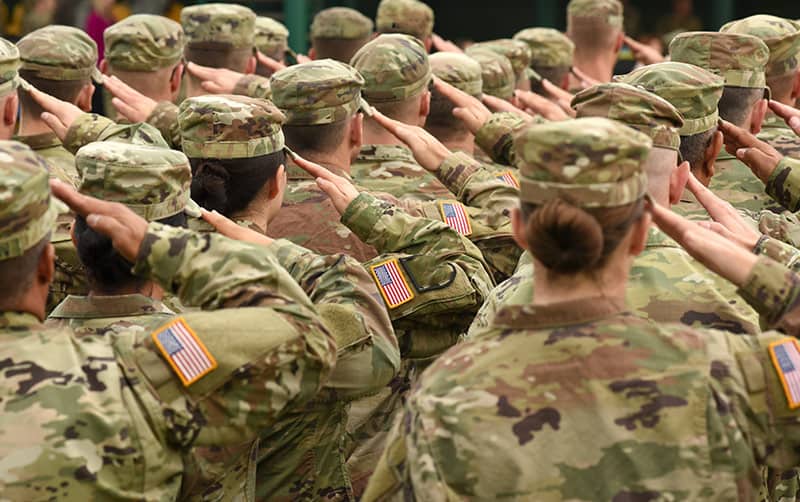
There are many aid options available to Veterans planning to attend.
Navigating this process can be a challenge. Our Financial Aid and Scholarship Offices are on hand to help guide you through the process.
Call 801-753-4105
Email financialaid@mtec.edu
Email scholarships@mtec.edu
The Utah State Approving Agency for Veterans’ Education Benefits approves several of the programs for payment of Veteran Affairs (VA) education benefits (such as the GI Bill®). Veteran students with eligible VA benefits must meet satisfactory progress and attendance requirements as outlined by the Utah State Approving Agency. These requirements are contained in an Enrollment Agreement Addendum that is available in the Financial Aid Office.
In addition, you may inquire directly with the Veterans Administration at http://www.gibill.va.gov/ Veteran students applying for admission to the MTECH who are eligible to receive credit for military training and experience are required to meet with a certifying official in the college counseling office.
Please contact the financial aid office, listed above, for additional information on program eligibility requirements and accessing your benefits.
As a student receiving financial assistance at MTECH, you are expected to uphold high standards of integrity and responsibility. Ethical conduct is essential in ensuring that financial aid, whether in the form of Federal Pell Grants, scholarships, or veterans’ educational benefits, is used appropriately and fairly to support your educational goals.
Students must provide accurate, complete, and honest information when applying for financial assistance. Misrepresentation or falsification of any information on financial aid applications, including the Free Application for Federal Student Aid (FAFSA), scholarship forms, or veterans’ benefits paperwork, is considered fraud and may result in disciplinary action, repayment obligations, and/or legal consequences. Students are also responsible for promptly reporting any changes in financial status, enrollment, or eligibility that may impact their aid.
Students are expected to understand the terms and conditions of the financial aid they receive. It is the student’s responsibility to stay informed, meet all deadlines, and adhere to satisfactory academic progress standards required for continued eligibility. Upholding these ethical responsibilities ensures that financial aid resources remain available to support all students equitably and effectively.
Students at Mountainland Technical College assume the personal obligation to conduct themselves in a manner that aligns with the College’s role as a public institution of higher education. By enrolling at Mountainland Technical College, students agree to maintain certain standards of conduct, which, if violated, may result in sanctions or other forms of College discipline. Please see the MTECH Student Code of Conduct (600.616) for more information.
Students are expected to maintain academic ethics and honesty in all their work and interactions with the college in all forms. Cheating, plagiarism, and/or falsification may result in suspension or dismissal. Please see Cheating Policy 600.617 for more information.
The Student Grievance Policy and Procedure (Policy 600.608) is in place to provide equitable and orderly steps to resolve grievances by students including both academic and non-academic concerns. Students should reference the policy and procedure directly for detailed instructions on how to file a grievance and how the College will address it.
Students at MTECH have the right to:
The Fourteenth Amendment guarantees a person’s basic rights to liberty or property, without due process of law. Due process ensures policies, procedures, plans and processes established by the college are applied consistently and without bias, and that any disciplinary actions or sanctions imposed on students are proportionate to the alleged misconduct.
Policy 600.623 for Student Due Process ensures the students’ rights are protected and they have a reasonable opportunity to be heard and present information before disciplinary action is taken against them that may lead to suspension of more than ten days or dismissal from the College.
Title IX is a federal civil right passed as part of the Education Amendments of 1972. This protects people from discrimination based on sex in education programs or activities that receive Federal financial assistance.
As stated in MTECH’s 300.304 Title IX policy, students may report any type of sex-based discrimination, sexual harassment, or sexual violence.
When made aware of sex-based discrimination or harassment, MTECH’s Title IX Office will take action to stop and prevent further misconduct, offer supportive measures to affected parties, and facilitate a resolution of the reported behavior (which may include accountability proceedings). MTECH also prohibits retaliation for reporting misconduct.
Members of the MTECH Campus Community should ensure they are not engaging in conduct prohibited by MTECH’s Title IX policy. Federal Title IX regulations define “sex-based” to include biological sex, gender identity and expression, sexual orientation, and pregnancy. Discrimination or harassment on the basis of any of these characteristics constitute a violation of policy and are reportable. Please review the full policy for a comprehensive list of prohibited conduct.
Any report of sexual misconduct or questions regarding this policy should be directed to:
Lynn Adams
Title IX Coordinator
2301 West Ashton Blvd.
Lehi, UT 84043
801-753-4245
ladams@mtec.edu
The Technology Department provides the infrastructure essential for using media materials. They set up and connect computers and peripherals. They troubleshoot issues and maintain the software and hardware, as necessary.
Faculty members and instructional staff receive training on the Canvas Learning Management System, the Student Information System (SIS), and other media resources as part of their new hire orientation. For students, a formal orientation is done on the first day of class. Instructors and/or staff members instruct on the use of all media. The Office of Teaching & Learning provides online resources to students that teach them how to navigate the Canvas Learning Management System.
Everyone has a responsibility for campus safety and security by reporting, complying, and participating. The Campus Security organization consists of a layered security infrastructure and several volunteer response teams including; the Emergency Operations Team, Crisis Intervention Team, Evacuation Team, Threat Assessment Team and Safety Committee.
Utah code 53G-9-206 states:
“Any individual who participates in any of the following activities in public or private schools that may endanger his vision shall wear quality eye protective devices:
‘Quality eye protective devices’ means devices that meet the standards of the American Safety Code for Head, Eye, and Respiratory Protection, Z2.1-1959 promulgated by the American Standards Association, Inc.”
Students must wear approved eye protection to work in labs, where required. The college sells approved protective eyewear at the MTECH store.
Title ll of the Crime Awareness and Campus Security Act of 1990 requires that MTECH annually issue a Crime Statistics report. This report is disseminated annually to employees and students via email and is available to the public on MTECH’s website under Campus Safety and Security.
MTECH is responsible for providing a safe and productive work and educational environment that is free from possession, use, or distribution of controlled substances. Students are subject to discipline for violation on any MTECH campus.
Any suspicion of violation will be reported to the MTECH Security team and may be referred to local law enforcement.
Drug and alcohol abuse prevention information is available to current and prospective students through academic counseling.
In accordance with the Utah Indoor Clean Air Act (R392-510),smoking, including the use of e-cigarettes, is prohibited entirely in places of public access and publicly owned buildings and offices. Smoking is not permitted inside or within 25 feet of any state-owned building entrance, exit, air intake, or window that can be opened.
MTECH students are expected to dress and behave in a professional manner in the classroom, externship, clinicals, and off-campus activities.field trips. This includes wearing clothing appropriate for the industry the student is training to work in.
Instructors will provide information on the specific professional attire expected for each program. Students dressed inappropriately will be asked to correct their attire before they are allowed in the lab. Students on industry externships must dress appropriately, or they will be asked to leave the site.
If a student fails to comply with the dress standards after being counseled by the instructor and Program Director, the student may be dismissed.
All vehicles parked on these campus lots require a parking permit. You can acquire a parking pass in all Student Services offices.
Parking Services offers an annual pass, valid from Aug 1 to July 31. You must complete a Parking Pass Request Form before receiving an MTECH Parking Pass. Passes for additional vehicles are $5.
Parking Pass Requirements for all campuses, except Provo:
Parking Pass Requirements for Provo campus:
Parking restrictions for all students:
Park at your own risk. The college is not responsible for theft, loss, or damages.
Career Services’ mission is to support you in achieving your career goals by promoting accessible opportunities to find a career or continue your education. We want you to feel confident as you explore your options. Connect with us for additional guidance in writing your resume, preparing for an interview, or expanding your job search. We can also help you transfer your MTECH credits to another Utah College or University to help save you time and money as you work towards a degree.
At MTECH, we are deeply invested in your education. Our Academic Counselors are available to help you navigate your academic experience, from the start of your program to graduation. Meeting with your counselor ensures you’re making informed decisions, accessing valuable resources, and setting yourself up for success.
Some of the things they can help you with include:
MTECH recognizes that a student’s mental health plays a vital role in their academic success. Stress, anxiety, and other mental health challenges can negatively impact focus, motivation, and performance. MTECH offers counseling services and peer coaching through TrulaCounseling and TrulaCoaching. These resources are designed to help students manage their mental well being while balancing the demands of college life. Our Academic Counselors can help you navigate these challenges and resources. MTECH is committed to creating a healthy, supportive campus environment where students can thrive both academically and personally.
The Rehabilitation Act of 1973 and the Americans with Disabilities Act (ADA) provide comprehensive civil rights and protections for persons with disabilities. MTECH does not discriminate in the recruitment, admission, educational process, or treatment of students with disabilities.
Students must voluntarily disclose that they have a disability, request an accommodation, and provide documentation of their disability. The Academic Counselors are the ADA (Americans with Disabilities Act) Specialists for the college and make arrangements for accommodations as requested.
All contact is kept in the strictest confidentiality.
Accommodation Request Process
Students must voluntarily disclose that they have a disability, request an accommodation, and provide documentation of their disability. The Academic Counselors are the ADA (Americans with Disabilities Act) Specialists for the college and make arrangements for accommodations as requested.
The student meets with an Academic Counselor and self identifies as an individual with a disability.
When a student completes a Request for Accommodation and returns it to the Counselor along with supporting documentation. Supporting Documentation should include:
Counselor and student engage in the interactive process to discuss barriers and potential accommodation(s).
Supporting documentation will be reviewed to determine eligibility. Additional Documentation may be Required.
Please note that any accommodations (IEP, 504 plan) that were or are in place at your high school do not transfer to MTECH. To start the process, please contact an Academic Counselor. More information can be found on the MTECH ADA webpage.
MTECH has a variety of libraries and learning resources available for our students:
Utah State Library – Public Libraries
There are several learning resource centers that allow adult students to be tutored in subjects such as: Mathematics, Reading, Writing, and/or Computer Skills:
MTECH offers FREE on-demand, online tutoring through Tutor.com. Stuck on a problem? Want someone to review your paper? This service is easy to use and can be accessed on any device that connects to the Internet. Tutors are available to you 24/7— even at 2:00 a.m.!
When you log in to your free Tutor.com account, you’ll be able to:
The Student Retention Plan focuses on helping students stay in school to complete their program and is intended to cover all students from the time they enter the College until they complete their program and graduate.
Mountainland Technical College (MTECH) defines success as providing quality technical education that leads students to completion of their program certificate, placement in a related occupation, and mastery of the skills needed to pass required licensure exams. Student support resources are provided to resolve issues that might cause a student to drop out of school or fail to complete their program.
Faculty support students in the classroom and may refer students needing help to college resources such as counseling, mental health support, food pantry, Financial Aid, Career Services, etc.
The complete Student Retention Plan can be found here.
The MTECH testing center serves to validate and enhance the learning of students. We provide a safe test-taking environment for our students and community members. Photo ID is required to take a test.
Hours and Locations are as follows:
Building A
2301 West Ashton Blvd
Lehi, UT 84048
Room 107 (Main Building)
Payson Campus
993 South 1950 West
Payson, UT 84651
Room 108
125 N 100 W St
Provo, UT 84601
Call 801-753-4110 or email testcenter@mtec.edu for more information.
Whether you’re a student, employee, alumni, or friend, the MTECH Store has everything you need to show your MTECH pride.
While most programs have their required materials included in their course fees, some items may need to be purchased from the MTECH Store including textbooks, workbooks, class materials, school supplies, program uniforms, snacks and drinks, and MTECH branded apparel.
Hours and Locations are as follows:
Building A
2301 West Ashton Blvd
Lehi, UT 84048
801-753-4167
Building A
1410 West 1250 South
Orem, UT 84058
801-753-4267
Building A
693 West 1210 South
Spanish Fork, UT 84660
801-753-4114
Store items can also be purchased online here and will be delivered to the Parcel Locker at the location selected. You will receive a separate email when items are ready for pick-up.
MTECH Store Return policy:
| Cookie | Duration | Description |
|---|---|---|
| cookielawinfo-checkbox-analytics | 11 months | This cookie is set by GDPR Cookie Consent plugin. The cookie is used to store the user consent for the cookies in the category "Analytics". |
| cookielawinfo-checkbox-functional | 11 months | The cookie is set by GDPR cookie consent to record the user consent for the cookies in the category "Functional". |
| cookielawinfo-checkbox-necessary | 11 months | This cookie is set by GDPR Cookie Consent plugin. The cookies is used to store the user consent for the cookies in the category "Necessary". |
| cookielawinfo-checkbox-others | 11 months | This cookie is set by GDPR Cookie Consent plugin. The cookie is used to store the user consent for the cookies in the category "Other. |
| cookielawinfo-checkbox-performance | 11 months | This cookie is set by GDPR Cookie Consent plugin. The cookie is used to store the user consent for the cookies in the category "Performance". |
| viewed_cookie_policy | 11 months | The cookie is set by the GDPR Cookie Consent plugin and is used to store whether or not user has consented to the use of cookies. It does not store any personal data. |